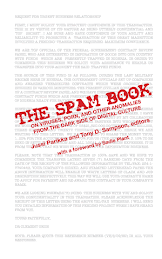My attendance at the 7th Feminist Research conference in Utrecht will remain brief, but today’s two early keynotes were already enough to keep me happy. Instead of hazy “ideas in progress”, remediation of what the person did 20 years ago (and still doing) or unprepared ramble through of bullet points, we actually had two really nice presentations with good commentators after that.
What surprised me was that I actually liked Sara Ahmed’s paper, as she comes from a bit different direction to cultural analysis as I do. Her talk on “Killing Joy” focused on the notion of happiness --- and feminism as a force of producing unhappiness, disruptions to expectations whether in dinner conversations or as a social cultural critical force. Despite the assumed natural goodness of happiness, we know little about what it is – this ontological question has always eluded philosophers as well with Kant already voicing critique of this notion: everybody wants happiness, but still we really don’t know much about what we want or will. Ahmed also pointed towards Betty Friedan’s early critique of the figure of “happy housewife”, and proceeded through a cartography of not only “archives of unhappiness” but contemporary field of knowledge production and feminism’s role in that.
So if the feminist is the kill joy at a coffee table, what does it mean more concretely as a horizon for production of knowledge? Ahmed was able to open up the concept’s etymology through its stem word “hap” – as in accidental, which pointed towards its role as something that happens to us, without control. Yet, it seems, especially in the midst of contemporary cultures of
standardized happiness production, there is much more to the notion than the early stems. In an interesting manner, Ahmed went through Nietzsche’s critique of habit and pointed out how its often more of a feeling of a feeling that an encounter of an object/event that causes happiness --- or unhappiness. Such things are often so loaded that we feel them before they happen in a manner of anticipatory causality – and odd futurity of sorts, that as a notion sounds very Deleuzian and points towards some of the themes Brian Massumi is known of. Again, outside her presentation, I was left thinking of happiness as an order-word of sorts that organizes emotions and feelings, as well as affects outside the linguistic sphere into such patterns of expectation that can be packaged also for the consumer industry.
The critical point of her presentation followed from the fact that things are not always causing what they should. The pattern of dissonance amidst things/events/discourses that should be consumed as expected is what can trigger points of critique – affect aliens/alien affects. Ahmed’s notion of affect differs quite a lot I think from that of e.g. Massumi, but the point here is clear, and Ahmed did use quite a lot of examples that pointed towards the pre-linguistic and even the pre-individual. This is why I was a bit disappointed with her conclusions that were framed through the discourse of false consciousness: breaking out of habits and modes of discourse as a tactic of feminism/feminists is something known from everyday life to academic articles, but Ahmed’s examples could have pointed towards the spheres of non-conscious cognition as well – its role in the cultures of happiness and expectation, the strange futurities that guide the present.
The second speaker Claire Colebrook delivered quite well what I expected; solid Deleuzian viewpoints, although not really hammering home her own point. This is something I at times have noted with Milla of her articles too; excellent positioning of questions and agendas, but a stronger development of her own solution to the positions would be needed. Today Colebrook talked about the notion of vitalism, and started by dividing them into three:
1) Cartesian: vitalism of mind, that contrasts with matter (CC pointed well, how Descartes is almost a straw-man for much of later criticism, which neglect the fact that Descartes also was quite radical in his time, and raised a huge row among the Christians).
2) The vitalism we find in theories of emergence, a more contemporary notion. This is what recent theories of cognition among others have embraced from Damasio to Dennett and others. A new appreciation of dynamics and “being-in-the world” which has led to the discovery of e.g. Heidegger by brain scientists. Interestingly, a lot of them talk about the world as “meaningful”. Organism emerges from complex dynamics, and hence no duality of mind and matter. Yet, organism-centred.
3) A perverse nomadic vitalism of Braidottian sorts which is not a vitalism of the organism/organic, but a much more distributed way of questioning what even counts as "a body", "a life".
To put it shortly, Colebrook pointed out how feminism has always been ecofeminism of sorts (which, I may add as a footnote, is a point elaborated by Verena Andermatt Conley in her study Ecopolitics). It has always attended to notions of relationality, milieu and crossing of the boundary between self and others, but still we need to make a clear case how it does not mean a simple “care for the environment” – in her critique of the notion of environment, Colebrook claims that it still relies too much on the idea of the Human Agent as separated, only surrounded by nature, instead of the idea of milieu that is something that transversally cuts through the human and her outside (an idea stemming e.g. from Simondon that Colebrook did not mention.)
Whereas the ideas on environing “caring” notions of being in the world have spread in the sciences as well as management studies (as Colebrook dryly noted, it’s the middle-managers who are now anti-Cartesian), we need to develop much more radical and less organism centred notions of vitalism. The organic model, even if reliant on dynamics and emergence, still thinks too much of the human being as the key agent for example in terms of the crises circulating around (eco and financial), instead of a more radical opening by nomadic vitalism that starts with the questions: what counts as a life, what counts as a body, what is even worth saving, and preserving? We need to keep an eye on the inhuman temporalities in which such notions of vitalism, the body etc. are to be interrogated also because of the practical consequences in the midst of ecocrisis and the financial crisis. I like Colebrook points a lot, but a key question/comment rose to mind: I think the division between the good nomadic vitalism and the still bad emergent vitalisms is not that clear-cut even if she has a point re. organisms. This still needs more work, and was implicitly raised by Rosi Braidotti in her comment to Colebrook’s talk: how the sciences can feed into and destabilize notions within cultural analysis.
Braidotti was again her usual vital self, with an amazing charisma and charm in the way she both offered a lucid philosophical point but also political empowerment that was gender-specific but as much tending the crucial points about geopolitics.
Braidotti pointed towards the key axiomatics of the modern world (and philosophy!) and hence cultural studies in terms of “otherness” – and the relays through which otherness has been negotiated: sex, race, nature; also axes of theory as we know after some decades of
.jpg)
representational analysis and intersectionality. Yet, the point about vitalism is made concrete as a challenge when we realize how such Master Codes have been reshuffled and scrambled by developments in the biosciences, -technologies, cognitive sciences, etc. which very concretely force us to rethink what are the differences that articulate otherness. In her powerful and funny punch line, Braidotti said that if her generation was focused on Dolly Parton, for the younger one its Dolly the Sheep. In her sweep from the demand for a “philosophy with an accent”, or in the diasporic mode (a point that I as a non-native English speaker loved!) to the implications of sexual perversions and sexuality as a force to create novelties, Braidotti was unbeatable, again. Both Braidotti and Colebrook agreed of course of the need to develop such thought that does not stem from the organism, but develops new forms of imagining; polymorphic sexualities, novelties of the mind and the body, new accents that destabilize the master codes.








Hi,
ReplyDeleteDidn't even know about this conference before. Sounds like Utrecht feminism is cutting an edge in feminist philosophy. Thanks for info!
yeah, they do really excellent stuff -- kicked off by Rosi Braidotti years ago, I would easily say they are the centre of feminist theory at the moment! There is a new interview DVD of Braidotti where she also opens up a bit of the history of how it all started, the Utrecht centre.
ReplyDelete